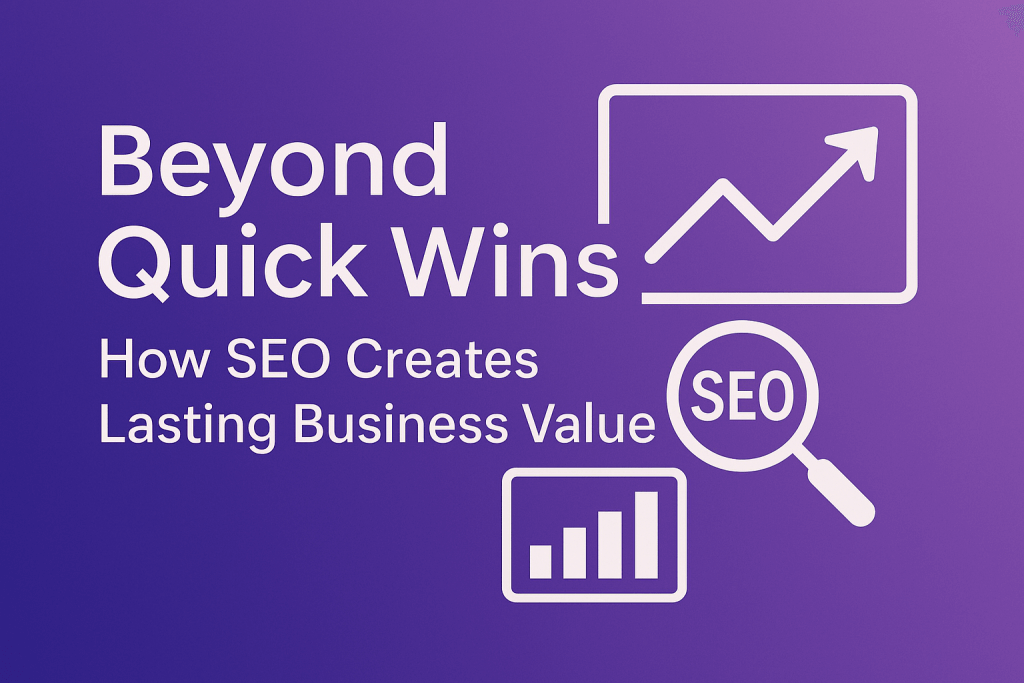Search Engine Optimization (SEO) is often misunderstood as merely a set of technical tricks to boost website rankings. While immediate visibility gains are certainly part of the equation, this narrow view fails to capture SEO’s true potential as a cornerstone of sustainable business growth. When implemented thoughtfully and maintained consistently, SEO creates enduring value that extends far beyond temporary traffic spikes.

The Foundation of Digital Presence
In today’s digital-first marketplace, a strong online presence isn’t just an advantage—it’s a necessity. SEO serves as the foundation upon which this presence is built, ensuring that potential customers can find your business when they’re actively searching for solutions you provide. Unlike paid advertising that disappears the moment you stop funding it, organic search visibility accumulates over time, creating a self-reinforcing asset.
Exults.com specializes in Search Engine Optimization and they state, “SEO is not a one-time project but an ongoing investment that compounds in value over time, similar to how retirement accounts grow through consistent contributions and compound interest.”
This compounding effect is what makes SEO particularly valuable for businesses looking beyond short-term gains. As your website builds authority and earns high-quality backlinks, each new optimization effort becomes more effective, creating a virtuous cycle that’s difficult for competitors to replicate quickly.
Customer Acquisition That Scales
One of the most compelling aspects of SEO is its ability to scale customer acquisition without proportionally increasing costs. While the initial investment in research, content creation, and technical optimization may be substantial, the marginal cost of acquiring each additional visitor through organic search approaches zero over time.
This scalability transforms SEO from a marketing expense into a business asset. As your content library grows and your domain authority increases, your website can rank for an expanding universe of search terms without requiring the same level of investment for each new keyword. This allows businesses to extend their reach into new markets and customer segments without the linear cost increases associated with traditional advertising.
Building Trust Through Visibility
Consumer trust is essential for conversion, and SEO contributes significantly to establishing this trust. When your website consistently appears in search results for relevant queries, it signals to potential customers that your business is established, relevant, and trustworthy. This perception is further reinforced when your content addresses their questions and concerns comprehensively.
Websites that rank well on search engines are often perceived as industry authorities. This perceived expertise translates into higher conversion rates and stronger customer relationships. By positioning your business as a thought leader through SEO-optimized content, you’re not just attracting visitors—you’re attracting qualified prospects who already view your brand as credible.
Insights That Drive Business Strategy
Effective SEO requires deep understanding of your target audience—their needs, questions, and search behaviors. The research that underlies SEO strategy yields valuable insights that can inform broader business decisions.
Keyword research reveals what potential customers are actually searching for, often highlighting needs or pain points you hadn’t considered. Content performance data shows which topics resonate most strongly with your audience. Competitor analysis uncovers gaps in the market that your business might fill.
These insights extend far beyond your marketing department. Product development teams can use search trend data to identify emerging customer needs. Sales teams can leverage high-performing content topics to address common objections. Customer service can anticipate questions based on popular search queries.
Resilience Against Market Disruptions
Businesses that build their customer acquisition strategy around paid advertising alone are vulnerable to sudden market shifts. Ad costs can increase dramatically, platforms can change their policies, or new privacy regulations can limit targeting capabilities.
A robust SEO foundation provides resilience against these disruptions. While search algorithms do change, the fundamental principles of providing valuable content and good user experience remain constant. Businesses that have invested in SEO have a more diversified acquisition strategy, reducing their dependence on any single channel.
This resilience was particularly evident during the COVID-19 pandemic when many businesses saw their paid advertising ROI plummet as consumer behavior shifted dramatically. Companies with strong organic search visibility were able to adapt more quickly, adjusting their content to address new search patterns without having to completely rebuild their acquisition funnels.
Competitive Advantage Through Barriers to Entry
The compounding nature of SEO creates significant barriers to entry for competitors. While a new competitor can launch a paid advertising campaign and begin acquiring customers immediately, they cannot quickly replicate years of SEO investment.
Domain authority, content depth, and backlink profiles take time to build. A business that has systematically developed these assets has created a moat around their digital presence that competitors must invest heavily to overcome. This advantage is particularly valuable in crowded markets where differentiation is challenging.
Long-Term Cost Efficiency
When evaluated over the long term, SEO often delivers the lowest cost per acquisition of any marketing channel. While the initial investment may be higher than some alternatives, the ongoing returns accrue with diminishing marginal costs.
This efficiency becomes even more pronounced when considering customer lifetime value. SEO tends to attract customers earlier in their buying journey—before they’ve defined their preferences or learned about competing solutions. This early engagement opportunity allows businesses to shape customer perceptions and build relationships that result in higher lifetime value.
Integration with Broader Business Objectives
The most successful SEO strategies aren’t isolated from other business functions—they’re integrated with broader organizational goals. Content created for SEO can support sales enablement, customer education, and brand positioning. Technical SEO improvements enhance site performance and user experience, benefiting all aspects of your digital presence.
This integration extends to other marketing channels as well. SEO data can inform social media content strategies, email marketing campaigns, and even offline marketing efforts. When SEO is viewed as a business function rather than a marketing tactic, its value multiplies across the organization.
Conclusion: SEO as a Business Asset
Far from being simply a set of techniques to manipulate search rankings, SEO represents a strategic investment in your business’s digital foundation. Its value extends beyond immediate traffic gains to create lasting business assets: a reservoir of high-quality content, technical excellence that enhances user experience, a reputation for authority in your industry, and a sustainable source of qualified leads.
When approached with patience and consistency, SEO transforms from a marketing expense into a proprietary asset that generates returns long after the initial investment. In a digital landscape where customer attention is increasingly fragmented, this enduring value proposition makes SEO not just a marketing necessity but a business imperative.
